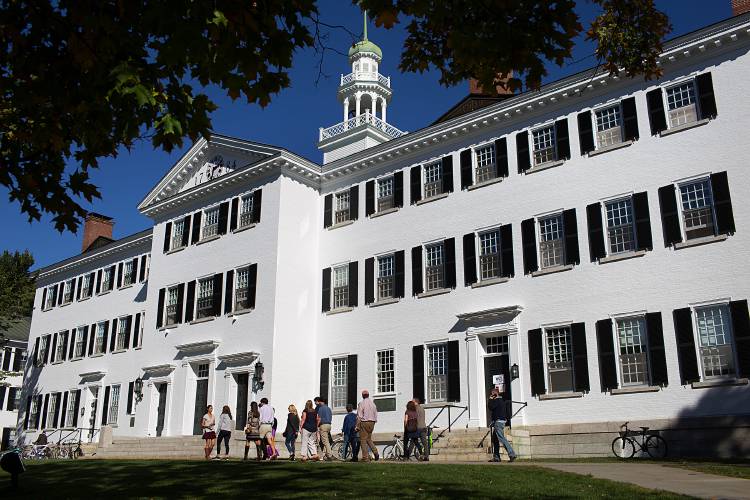Editorial: Is the rise of mental health issues connected to the decline of the humanities?

Prospective Dartmouth College students are given a campus tour in Hanover, N.H., on October 7, 2016. (Valley News - Geoff Hansen) Copyright Valley News. May not be reprinted or used online without permission. Send requests to permission@vnews.com. Geoff Hansen
| Published: 10-30-2023 10:23 AM |
Two alarming developments on college campuses are the widespread mental health issues being experienced by students and a precipitate decline in the study of the humanities. Although it may seem far-fetched, we can’t help but wonder whether there is some connection between the two.
The origins of the mental health crisis among young people have been the subject of much speculation: social isolation imposed by the pandemic; the adverse effects of digital immersion; existential dread of mass shootings; stress imposed by youthful lifetimes of sky-high and impossible-to-fulfill expectations; despair about the future of a world degraded by climate change are among those we have noted.
To its credit, Dartmouth is among the institutions devoting increased attention and resources to student well-being. As our colleague Nora Doyle-Burr reported last week, the college has released a five-year plan aimed at improving student mental health and well-being, following up on President Sian Leah Beilock’s inaugural-address pledge to assign a high priority to the issue.
At the same time that a nationwide mental health crisis has been brewing, fewer and fewer college students have been choosing to major in the humanities. During the past decade, the study of English and history at the university level in the United States has fallen by a third; humanities enrollment overall has declined by 17%, according to data collected by American Academy of Arts and Sciences. Majors in the classics, the arts and religion have been eliminated at some schools; humanities departments are shrinking at many others, including prominent universities.
Many factors are contributing to this decline, prominently including the desire of students and their families to monetize their degrees in the job market after graduation; the decline of core-course requirements in the humanities; societal emphasis on the importance of science, technology, engineering and mathematics in creating new knowledge; the ascendance of statistical measurement as the gold-standard of analytic rigor; and a sense among students arriving at college that, in the words of a Harvard professor interviewed by The New Yorker magazine for an article titled “The End of the English Major,” the past has nothing left to teach.
To the contrary, even a moment’s reflection should suggest that the humanities can speak to us movingly in the urgent crises of our times. Take the appalling developments unfolding in the Middle East. May not the insights and experiences of a Primo Levi illuminate the nature of incomprehensible evil? And of the consequences of blind rage in wartime, the Iliad has something important to tell us. Indeed, the Italian writer Italo Calvino described a classic as “a book that has never finished saying what it has to say.”
The past has much to impart to today’s students — perhaps especially to those beset by anxiety, despair, depression and a general sense of hopelessness. The masterpieces of literature, art, music, religion and philosophy transmit down through the ages the most profound insights into the human condition that we have available; in many cases, these great works have been produced by artists who have grappled with and transcended the very problems that young people are now experiencing — and have always experienced.
The study of the humanities distills what is universal in human experience, which is invaluable at this time when a fractured and atomized society dwells on group identities that are all too often defined primarily by a sense of particularized victimhood. The realization that everyone suffers in one way or another is an insight required to taste life’s bitter cup of sorrow or grief and come out of that dark time with a sense of perspective and purpose. Martin Luther King Jr. urged those he called the “veterans of creative suffering” to continue “to work with the faith that unearned suffering is redemptive.”
Article continues after...
Yesterday's Most Read Articles
 Stolen White River Junction weathervane returns after 40 years
Stolen White River Junction weathervane returns after 40 years
 Enfield Zoning Board approves variances for 300-unit development
Enfield Zoning Board approves variances for 300-unit development
 Beilock’s leadership divides students; ‘no confidence’ narrowly passes
Beilock’s leadership divides students; ‘no confidence’ narrowly passes
 Homeless Upper Valley couple faces ‘a very tough situation’
Homeless Upper Valley couple faces ‘a very tough situation’
No one can predict whether the pendulum will swing back toward the study of humanities on college campuses, but the prospect of the university primarily as a glorified vocational school is beyond depressing. Immersion in the liberal arts is an important way in which young people come to know themselves and their place in the world. The Romans called them artes liberales — “the arts of free people.”

 Editorial: Response to campus protests only adds fuel to the fire
Editorial: Response to campus protests only adds fuel to the fire Editorial: Chris Sununu’s moral vacuum
Editorial: Chris Sununu’s moral vacuum Editorial: Gambling tarnishes America’s sporting life
Editorial: Gambling tarnishes America’s sporting life By the Way: A white nationalist’s many mistruths
By the Way: A white nationalist’s many mistruths
